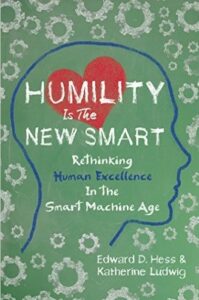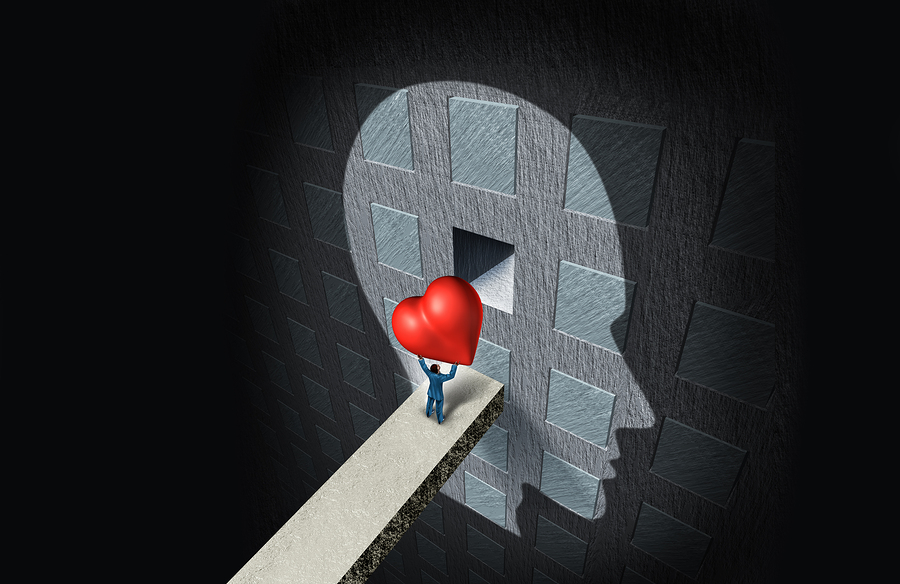Rethinking Excellence in the Smart Machine Age
Artificial intelligence will change everything. It’s coming. In some areas, it has already arrived.
Take Amazon. Its new grocery store has no cashiers and no baggers.
How about water meter readers? Just yesterday someone appeared at our door explaining that those days are over for our neighborhood.
And it’s not only these jobs that are changing. Millions of jobs will be affected from manufacturing to services.
Machines have access to more data than we do. They can analyze it faster than we can.
Edward D. Hess is a professor of business administration at the University of Virginia Darden School of Business. In addition to fifteen years in academia, he also spent twenty years as a business executive. His research is in high performance in the midst of change.
He argues that we need to change our definition of smart. We need a new smart. We need to be good at what machines can’t do well. His new book, co-authored with Katherine Ludwig, is Humility is the New Smart: Rethinking Human Excellence in the Smart Machine Age.
I recently spoke with him about the changes ahead.
Millions of Jobs Will be Automated
What jobs will be automated?
Over the next decade or so, tens of millions of service and professional jobs will be automated along with more manufacturing jobs. Service jobs that are at risk include retail, fast-food, manual laborers and construction workers, truck drivers, accountants, administrative people, paralegals, customer service reps, and security guards. Increasingly, professional jobs will be automated reducing the number of professional workers needed in the fields of accounting, law, finance, consulting, marketing, strategy, management, journalism, medicine and architecture. The Chief Economist of the Bank of England in November of 2015 predicted that over the next decade or two 80,000,000 jobs in the United States could be automated.
How to Prepare for the Smart Age
What should people who are worried about their future and livelihood do to prepare for an automated world?
Start preparing themselves and their loved ones to excel at doing the types of job tasks that technology will not be able to do well. Those include higher-order critical, creative and innovative thinking, and/or rendering services to other individuals that requires high emotional engagement and, thus, high emotional and social intelligence, and/or trade jobs that require real-time problem solving and complex manual dexterity. Begin now to upgrade one’s skills in order to stay relevant. No one will be exempt from the need to upgrade.
To excel at those skills requires one to accept the science that clearly shows that our natural reflexive way of thinking, listening, and relating to others hinders our abilities to do the needed tasks excellently. Our book puts forth a science-based approach of how to train oneself to do the needed skills well. It is a personal “how-to” book – we invite people to begin their journey to human excellence with a diagnostic, and we offer tools and how to train like a champion process that is based on the best science.
You introduce a new definition of “being smart” called NewSmart. Why is it important?
Most of us were raised in a school system that ranked people by test scores. You were deemed smart by making the highest scores and, thus, making the fewest mistakes. That definition of smart penalizes making mistakes and determines smart by how much you know. It is a quantity based definition. Well, in the Smart Machine Age, that definition and approach is the sure road to unemployment because no human being will know more or remember more than a Smart Machine. We can’t outsmart a Smart Machine – therefore, we need a new definition of what “being smart” means that will help us develop the skills to win.
That is “NewSmart.” No longer is being smart determined by what or how much you know but rather by the quality of your thinking, listening, relating and collaborating skills – the skills that are necessary to do the types of thinking (critical, creative and innovative) that the smart machines will find hard to do. In the Smart Machine Age the #1 job skill will be “knowing how to iteratively learn” – how to learn throughout your life so you can stay ahead of the technology as it advances. Iterative learning occurs when you try new things, new approaches and see what works – you learn from mistakes. Making mistakes will be a necessity in the new game of success. The only mistake in the new game will be not learning by making the same mistake again. The NewSmart principles discussed in the book are designed to make that mind shift easier for people.
Tell me about the title and how you chose it for your book.
The biggest human obstacles to being able to excel at the tasks that technology won’t be able to do well are ego and fear. The science is clear on that. We tend to be confirmation-biased thinkers and emotionally defensive reasoners. When we studied high performance organizations that think and perform excellently like Google, Pixar Animated Studious, Bridgewater Associates, L.P., IDEO, W.L. Gore & Associates and the United States Navy Seals, we found that humility was a core ingredient of their cultures and behavioral systems.
In order to excel at thinking or at emotionally engaging with others, one has to tamp down the self-focus and the emotional defensiveness in order to be open minded and to evaluate the strength of one’s views and the views of others. And one has to not identify with one’s beliefs.
(I am not talking about values). That is the psychological construct of humility. Unfortunately, in our society humility means to some people being submissive or thinking lowly of oneself. That is not the psychological definition of humility, which is having an accurate view of self; being willing to consider and seek out information that disagrees with what you think and having a low self-focus so you can perceive the world as it is, not as you want it to be. Psychological humility is the gateway to excellent thinking, listening and relating with others.
We intentionally chose the title because the science dictated that for our model of self-improvement, and we chose it to challenge our cultural focus on the “big me” because the science is clear – none of us can think or flourish at our highest levels alone – we need others. And we need a quiet ego to do that. That is humility.
Automation. Technology. Those words are not usually associated with quiet ego, self-management and mindfulness. Would you explain this connection?
We are on the leading edge of a technology tsunami that is likely to be as disruptive for us as the Industrial Revolution was for our ancestors. We humans will be in a frantic race to stay relevant in the workplace. In order to do that we have to become excellent at doing the tasks that technology won’t be able to do well. That requires us to overcome our natural inhibitors – our ego and fears. To aid in doing that, we all need to start with the behavioral building blocks that underlie high-level thinking and emotional engagement. Those building block behaviors are having a quiet ego; managing self – one’s thinking and emotions; reflectively listening; and “Otherness” – being able to connect, relate and collaborate with others in ways that build trust.
Our book puts forth a roadmap based on over 600 leading academic articles across disciplines and over 100 leading books of how to improve the unique human skills that will be needed in order to have meaningful work in the coming years. The concepts are simple; the hard part is having the daily rigor to improve oneself – to measure and hold oneself accountable and to be mindful of the hundreds of choices that we have every day to either act deliberately or on auto-pilot. It requires us to become better thinkers, listeners, relators and collaborators. No one will be exempt – everyone will have to take their performance to a higher level. Winners will be those people who work hard daily on their personal journey to human excellence.
Human excellence is based on how one behaves – how one engages, how one thinks, how one listens, how one emotionally connects to others, etc. And human excellence is all about emotions – feelings: managing them, using positive emotions to perform better, and emotionally building trust with others because in the near future most work will be done in small teams and for and with other human beings.
How Leaders Should Prepare Organizations
How will organizations of the future be different? How should leaders approach this different tomorrow?
Organizations will be staffed, operated and managed differently. Most organizations will be staffed by some combination of smart robots, artificial intelligent systems and human beings. Human beings will do the tasks that technology can’t do well. In most cases that will require small team structures. And it will require a humanistic people-centric internal system designed to enable and promote the behaviors that underlie excellent human thinking, engagement and collaboration. That means in many cases the creation of a new culture, new leadership model, new HR policies, and new measurements and rewards.
 While technology will reduce the size of the human workforce in many organizations, for those human beings working in the organization, the work environment will become much more people-centric and will be designed around three psychological theories: Positivity; Self-determination; and Psychological Safety in order to enable the highest levels of human thinking and engagement. The industrial Revolution model of management and leadership will become obsolete. Human Resource functions will become Human Development functions. Diverse work forces will become a strategic necessity. More women will make it to the C- suite.
While technology will reduce the size of the human workforce in many organizations, for those human beings working in the organization, the work environment will become much more people-centric and will be designed around three psychological theories: Positivity; Self-determination; and Psychological Safety in order to enable the highest levels of human thinking and engagement. The industrial Revolution model of management and leadership will become obsolete. Human Resource functions will become Human Development functions. Diverse work forces will become a strategic necessity. More women will make it to the C- suite.
To stay competitive, most organizations will have to make four big transformations: integrate the new technologies into every business function; transform its work environment to enable human excellence; change its leadership model and leaders’ behaviors in order to role model the behaviors that underlie human excellence; and adopt a human development approach to attracting, developing and retaining the best human thinkers, creators, innovators and collaborators.
The organization, its leaders and its people all will have to change in science-based ways to harness the power of the new technologies and the uniqueness of human beings in order to succeed. It is a different model than exists in many organizations today.
For more information, Humility is the New Smart: Rethinking Human Excellence in the Smart Machine Age.

